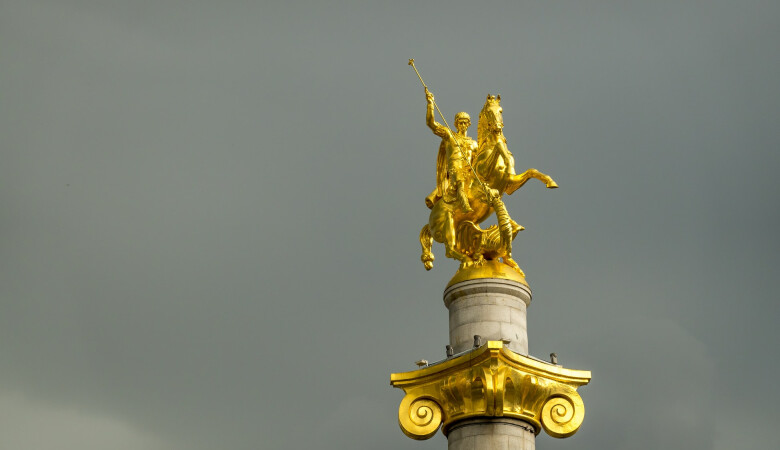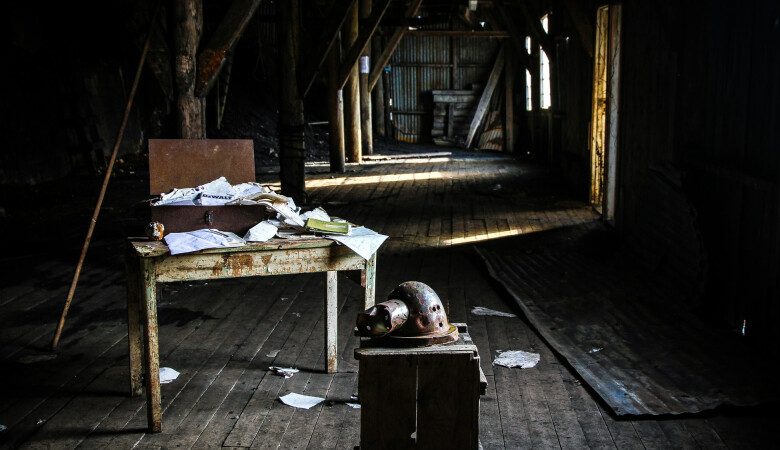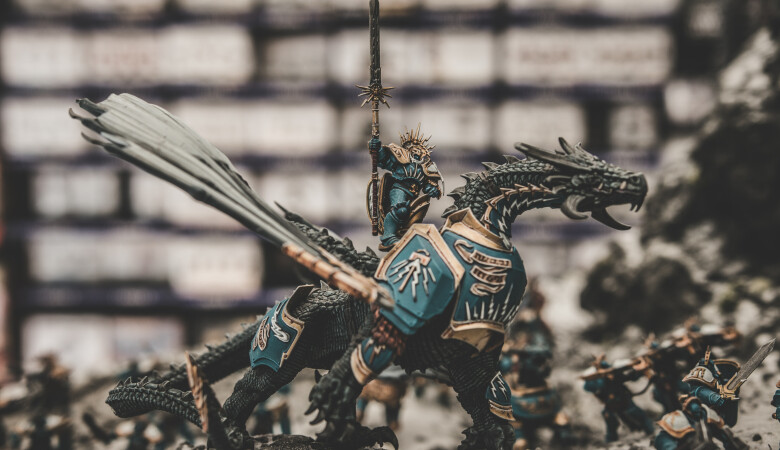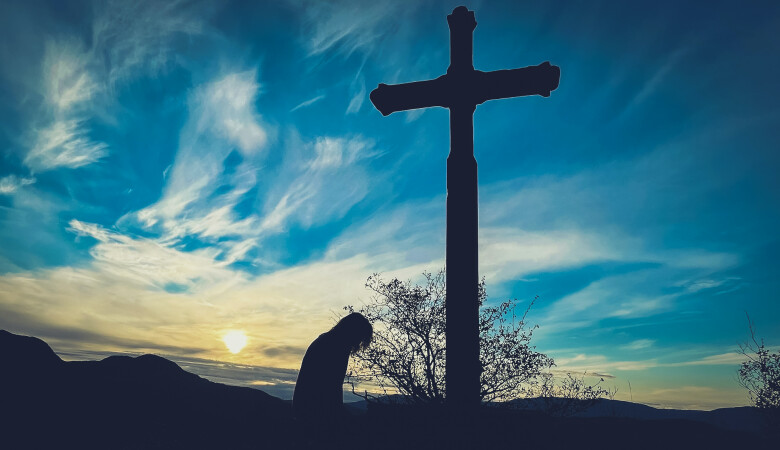Series: Job
Dragonslayer (Job Sermon 27)
November 07, 2021 | Andy Davis
Job 40:1-41:34
Spiritual Warfare, Providence and Sovereignty of God
God speaks of two mysterious beasts: the behemoth and the leviathan. He uses them to humble Job, remind him of his limits, and that he can't save himself.
- Sermon Transcript -
Turn your Bibles to Job 40. We continue our sermon series in the book of Job. As we do, I am mindful of a pretty spectacular moment in the history of Israel. The prophet Elisha and his servant were surrounded by an invading army sent by the king of Syria who was enraged at the prophetic gift of Elisha, and the fact that he was telling military secrets to the king of Israel, so that the king of Syria was consistently thwarted in his efforts, militarily. And the king of Syria was frustrated, and sent a whole army to capture one man who was residing in Dothan. And they went stealthily through the night, snuck up into position, did everything right militarily, surrounded the city, and they're ready to capture this one man. And as the sun rose early in the morning, Elisha's servant went out and suddenly saw the Syrian army surrounding Dothan and figured that the game was up. Terror filled his heart. And he went back to the prophet and he said, "Oh my Lord what shall we do?" And Elijah said these words, "Don't be afraid. Those who are with us are more than those who are with them." And then he prayed this prayer. "Oh Lord, open his eyes that he may see." Then the Lord opened the servant's eyes and he saw hills full of horses and chariots of fire all around Elisha.
So I have that story in mind as I preach this sermon today because I believe that surrounding us every moment of our lives is a spiritual dimension, sometimes in scripture called the heavenly realms. This spiritual dimension cannot, ordinarily, be perceived by our five senses, though occasionally the barrier, whatever it is, between this physical world and the spiritual dimension, the spiritual realms, is occasionally torn open, such as at Jesus's baptism. That's the very word used in Mark's gospel, the heavens were torn open, and the Spirit descended on Jesus. Or again, at Stephen's martyrdom, the heavens were torn open. He saw Jesus standing at the right hand of God. So occasionally, that membrane, or that wall, that barrier is torn open, but usually not. And everything that we know about the spiritual dimensions we learn in scripture. We read words in scripture and find out these truths and believe them, so that we are aware of the spiritual realms, and that within the spiritual realms that surround us at every moment are powerful beings called angels and demons. And these angels and demons are created beings. They have great power and great influence over the unfolding events of Earth and the unfolding events of our lives. They exert an invisible but constant force on the minds and the bodies of people, so the scripture says. Now this morning, this sermon is meant to be a plea to all of us. As Elisha said, "Lord, open our eyes that we may see."
I. Open Our Eyes That We May See
Now the book of Job, big picture, is addressing the problem of evil and suffering in the world. We have walked through ... We're in the 40th chapter now. We've walked through, again and again, this issue, given to try to explain why it is that there is so much evil and so much suffering and destruction in this world. And specifically for us as followers of Christ, why do bad things happen to God's people? How do we understand that? And I am asserting today that the problem of evil and suffering in the world cannot be fully and rightly explained, understood, without understanding the effect of Satan and his angels called demons. So we come to Job 40 and 41, and these two animals, behemoth and leviathan. And immediately we come, as I have week after week in the book of Job, to the problem of hermeneutics, or Bible interpretation. What shall I do with these two animals? How can we rightly divide the word of truth? My desire is not just to feed you one meal, but to teach you also how to feed yourselves rightly from scripture, so that throughout the week you can read the Bible accurately and rightly for yourselves. So I try to work through that at various moments in the book of Job.
And I believe that this issue of spiritual warfare, the opposition of demons and of Satan, is such a significant issue that I plan on spending two weeks on this topic. Originally, this sermon was one sermon called “Dragonslayer.” Isn't that exciting? What a great title. But then I realized the sermon was 23 pages long and getting longer. It was growing at night without me doing anything. It just kept getting longer and longer. And so I said, "All right, I've got to separate them." But separating sermons like that is like separating conjoined twins. And both of those twins have to live, so how do we do this? How do we understand? So I thought let's have two sermons on Jesus as dragonslayer. And it really makes sense because Jesus has been slaying this dragon for 2000 years. It's a long, slow death he has ordained for Satan. And he will, in some sense, instantly put his career to an end, in the future, but not yet. In the meantime, it's a long slow death, and that's pretty exciting. So we get to walk through it for two weeks.
And so I have the problem of hermeneutics, of Bible interpretation, with behemoth and leviathan. Who are these mysterious beasts? And they're described only, simply, in beast like terms. So let's understand the context in the book of Job. God has been speaking to his suffering servant Job. Job has had his life shredded by wave upon wave of suffering: the loss of all of his wealth, and the loss of all of his children and then, in phase two, the loss of his health, wave upon wave, and then some ongoing debates and discussions with his friends about the problem of evil, which make up the bulk of the book of Job. And during that time, little by little, by little, more and more of Job's sin came out, emerged where he sinfully accused God of injustice and wrongdoing in his case. To humble Job, God appears and speaks to him out of a storm, a whirlwind. Job 38:2-3, "Who is this that darkens my counsel by speaking words without knowledge? Brace yourself like a man. I will question you and you shall answer me." He then exposes Job's frailty and limitations as a man by rolling out natural theology, what we can learn from God's creation. That's what he confines, that's what God confines his comments to with Job. He walks Job through overwhelming evidence of the attributes of God woven through creation. God's power in creating the universe, the foundations of the Earth, the boundaries of the sea, the clouds, the rhythm of sunrise and sunset, the patterns of weather, snow, hail, lightning, thunder, the path of the east winds, the giving of the right amount of rain and dew to satisfy the grasses on the Earth, the freezing patterns of ice, even up to the distant stars that make up the constellations, and the laws of physics that control their motions. The use of all of these inanimate objects that God made show his great power and his wisdom.
And then he brings forth animate creatures, animals, 10 of them, one after the other, animals and birds that God made and controls: the lion, the raven, the mountain goat, the deer, wild donkey, wild ox, the ostrich, the horse, the hawk, and the eagle. He cites their birth, their habits, and habitats, their feeding, their marvelous attributes, the stealthy hunting at night of the lion and the lioness, the mighty strength of the ox, the freedom of the wild donkey, the speed of the ostrich, the bold courage of the horse, the flight of the hawk, the eyesight of the eagle, all of these attributes. But he keeps mixing it in with Job's limited attributes, his limitations. “Job, you are limited in time. I am not. You are limited in wisdom. I am not. You are limited in power. I am not. So how then, Job, can you think to question me? How can you think to challenge me? How can you question my justice?” And by the time this work of natural theology spoken by the Creator of it all is done, Job is humbled. And he says in Job 40:3-5, “Job answered the Lord, ‘I am unworthy. How can I reply to you? I put my hand over my mouth. I spoke once, but I have no answer. Twice, but I will say no more.’” But God, as I said last week, didn't feel that the work was done. Still more humbling work to do. He doesn’t- God doesn't deal lightly with the corruption of his children. And so he probes deep and deeper, even deeper still. And basically just says the same thing again, we've got more to say, verse 6-7, "Brace yourself like a man. I will question you and you shall answer me." We saw last time that God addresses at that part of Job 40, the fundamental disrespect of Job toward God is fundamental unbelief, charging God with injustice. Verse 8, "Would you discredit my justice? Would you condemn me to justify yourself?"
Now this is the very thing we must not do when we're suffering afflictions, and that is see God as the enemy. God is not accountable to us. He doesn't owe us any explanation. He's infinitely above the entire human race, and he knows exactly what he's doing. Job is not God. He has no splendor of his own. He has no glory radiating from his being, and he has no mighty voice. Verse 9-10, "Do you [Job] have an arm like God's? Can your voice thunder like his? Then adorn yourself with glory and splendor, and clothe yourself in honor and majesty.” “And restrain the evil doers of the earth. And if you can do all of that, then I will admit, myself, I will admit to you: that your own right hand can save you."
So that's exactly where we're at in the Book of Job. So, Job, you're limited in time, limited in knowledge, limited in power, and you cannot save yourself. That's exactly the point we're at in Job. We suffering human beings cannot save ourselves. But from what? Who's the adversary, what's the adversary? How do we understand that adversary? Now we've got these two beasts that come in, behemoth and leviathan. God wants Job to know that his own right hand cannot save himself, and then implies we've got two enemies to talk about, because, unlike the 10 animals, he puts Job in an adversarial relationship with these two animals, behemoth and leviathan. Can you fight them? Can you overcome them? He doesn't do that with the other 10 animals. And basically, the concept you cannot save yourself is, in my mind, expanded to these phrases. With these two beasts, you cannot control them, you cannot capture them, and you cannot kill them. But I can control them, I can capture them, and I can kill them. So that's the simple way of looking at these two beasts.
Now, again, with Bible interpretation, we can simply just take them as animals, just two more animals. Should we do that? Should we just take them as literal predators that are just too hard for human beings to conquer, but God has no problem dealing with them? And so the argument, then, is just how then can you challenge God, such a mighty God? He's greater than they are. So if you can't handle them, you certainly can't handle God. And so you got 10 animals, and then Job's repentance, and then you got two more animals, possibly. Some Christian scholars do that. It is safe in one respect. You're just taking the words at face value. Two mighty animals you cannot control, you cannot capture, you cannot kill. God can, so be humble before God. Don't question God. Repent before God. If you can't deal with them, you can't deal with me. That's it. And that fits if you look at chapter 41, the next chapter, verse 10 and 11 in the middle of the leviathan section he basically does this. He says, “No one is fierce enough to rouse leviathan. Who then is able to stand against me? Who has a claim against me that I must pay? Everything under heaven belongs to me.” So that's a simple way of understanding these two animals. How much more argument? If you can't handle these animals, then you certainly can't handle their Creator. And then, what you would do is try your best to identify these animals, which almost certainly all of your Bibles have done in the footnotes. What do you have in your footnotes? “Pastor, we have hippopotamus and crocodile.” Is that what you have? I don't know. Maybe you have a study Bible with more options. I don't know. What are they? But I can tell you right now, no matter what you choose, absolute certainty on the literal interpretation will elude you. We don't know for sure. We don't know what the ... But the point is straightforward. God is mightier than they are, so humble yourself before God. And at that point I could just pray, and we would be done with the sermon. You've heard it. All right. There's nothing more to say. But I personally do not find this satisfying. Seems like a letdown at the end of all these chapters. Ten animals, and now two more animals. I feel like that point's already been made. Job's already repented. And now we're going to circle back with two more animals and make the same point again. But I think the problem of evil and human suffering is far deeper and greater than that. And I think God wants to help us. God wants to give us some answers.
And another issue that is openly brought up at the beginning of the book is never addressed again, and that is the role of Satan in human suffering. It's openly brought up for the first two chapters. Satan's one of the main dominant characters in Job 1-2. And then he drops off the account entirely. He's just never mentioned again. So you can go back and look, or just listen, Job 1:6-12, right at the beginning of the book, "One day, the angels came to present themselves before the Lord, and Satan also came with them. The Lord said to Satan, 'where have you come from?' Satan answered the Lord, 'From roaming through the Earth and going back and forth in it.' Then the Lord said to Satan, 'Have you considered my servant Job? There is no one on Earth like him. He is blameless and upright. A man who fears God and shuns evil.' 'Does Job fear God for nothing?' Satan replied, 'Have you not put a hedge around him, and his household, and everything he has? You've blessed the work of his hands so that his flocks and his herds spread through the land. But stretch out your hand and strike everything he has, and he will surely curse you to your face.' The Lord said to Satan, 'Very well, then. Everything he has is in your hands.'" It's a key statement, isn't it? "'But on the man himself, do not lay a finger.' Then Satan went out from the presence of the Lord." Then, as the narrative continues in Job 1, the loss of Job's oxen, donkeys, sheep, camels, and even his 10 children, immediately follows Satan going out from the presence of the Lord when God says, “Everything he has is in your hands.” And then look what happens. Satan's direct activity in the rest of Job 1 isn't mentioned. He's not there in the rest of Job 1. But it's just so openly implied that all of those things that happen, happen because of Satan.
Then in phase two Satan comes back and God directly ascribes the suffering in Job's life to Satan's accusations and activity. Some might argue Satan was not mentioned, therefore not really involved. If you read the account, it was the Sabeans that took Job's oxen and donkeys, the fire of God, whatever that means, fell from the sky and burned his sheep and his servants. The Caldeans came in and stole his camels. And a mighty wind from the desert destroyed Job's children. But just the way Job 1 reads, Satan's behind all of that, all of it. And then in chapter 2:1-6 it says, "On another day, the angels came to present themselves before the Lord. And Satan also came with them to present himself before him. And the Lord said to Satan, 'Where have you come from?' Satan answered the Lord, 'From roaming through the Earth and going back and forth in it.' Then the Lord said to Satan, 'Have you considered my servant Job? There is no one on Earth like him. He is blameless and upright, a man who fears God and shuns evil. And he still maintains his integrity, though you incited me against him to ruin him without any reason.’ ‘Skin for skin,’ Satan replied. 'A man will give all he has for his own life, but stretch out your hand and strike his flesh and his bones, he will surely curse you to your face.' The Lord said to Satan, 'Very well, then. He is in your hands. But you must spare his life.'" And this time there can be no doubt because it openly says in Job 2:7, "So Satan went out from the presence of the Lord and afflicted Job with painful sores from the souls of his feet to the top of his head." Satan's activity and disease is a deep mystery, isn't it? We'll find out in heaven how active he was in crafting viruses to cause trouble. There's an intelligence behind it. But on that, I'm not going to go any further. It just openly says in Job 2:7 that Job's afflictions, physical afflictions, were directly worked by Satan.
It is reasonable, therefore, I think, to see all of the calamities that came on Job as mediated to him directly by Satan. And I think, therefore, any explanation of evil in the world must address the activities of Satan. Yet, Satan's not mentioned again in the book of Job. He never comes up in the debates between Job and his friends. Elihu never mentioned Satan. God never openly mentioned Satan in all of his statements here at the end of the book. But it may well be that behemoth and leviathan represent the demons and the devil, though hidden behind the forms of beasts.
Satan appeared first in the Bible as a serpent in the Garden of Eden, so this isn't at all far fetched. And even Peter in I Peter 5 says, "Be self-controlled and alert. Your enemy the devil prowls around like [what?] a roaring lion seeking someone to devour.” He's like an animal. So if behemoth and leviathan represent Satan and demons, then to some degree, I feel that the book of Job has come now full circle. And we're going to come around to, to some degree, the real enemies of the human race. God is saying to the human race, “Evil and suffering in the world is directly worked by the devil and his demons. They use wicked men as their puppets, but they control this evil world. And behemoth, representing demons, and leviathan, representing Satan, are vastly more powerful than you are. You cannot control them. You cannot capture them. You cannot kill them. But I can.” And in the end he will. And that is a consolation to us in the midst of our suffering. So in that sense, it's satisfying. And beyond that, God will continue in a very powerful, wise, infinitely deep way to channel, and control, and block, and reign in, and use demons and Satan to do things in every generation, literally, I would say every day, in ways that we will discover, I think, in the next world. But in the meantime, we just know general principles that God puts hedges of protection, and leashes, and does all of these things to advance his own purposes. So, I am 100% biblically certain that Satan and demons are directly involved in human suffering every single day. I am not so certain that behemoth and leviathan are talking about that at all. So if you are a let's stick to the animals person, you've heard your sermon. For the rest of you, I'm going to go on and say we're going to talk about behemoth as representing demons, and leviathan as representing Satan.
II. Leviathan Representing Satan: Job 41
And in taking this symbolic approach, leviathan, I believe, is the key, just in the book of Job. You have to jump ahead to leviathan, though; I'm not going to walk through the leviathan versus today, but next week. He's the key because he shows up in Psalms and he shows up in Isaiah, and especially Isaiah 27:1 is important for me. He, leviathan, is mentioned in Isaiah as an enemy whom God will slay in the future. Isaiah 27:1, "In that day, the Lord will punish with sword his fierce, great, and powerful sword, leviathan the gliding serpent, leviathan the coiling serpent. He will slay the monster of the sea." a direct enemy of God, who God will slay with his sword, his fierce, great, and powerful sword. What a great verse. John Calvin, in commenting on Isaiah 27:1, wrote this. "The word Leviathan is variously interpreted. But in general, it simply denotes either a large serpent, or whale, or sea fishes, which approach the character of monsters on account of their huge size. For my part, I have no doubt that he speaks allegorically of Satan and his whole kingdom, describing him under the figure of some monstrous animal." Calvin hated speculation. That's not the kind of interpreter he was. He's just saying, to me, it's patently obvious in Isaiah 27:1 that leviathan represents Satan. So it seems to me, best to do the same with Job 41. Leviathan represents Satan, the monster whose wickedness is devastating the whole Earth. It's made even stronger when you read Job 41 and the descriptions of leviathan and he seems like a fire-breathing dragon, especially verses 14-17. He says, "Who dares open the doors of his mouth, ringed about with his fearsome teeth. His back has rows of shields tightly sealed together. Each is so close together that no air can pass between. They're joined fast to one another. They cling to together and cannot be parted." And then fire breathing stuff in verses 18-21. "His snorting throws out flashes of light. His eyes are like the rays of dawn. Firebrands stream from his mouth. Sparks of fire shoot out. Smoke pours from his nostrils as from a boiling pot over a fire of reeds. His breath sets coals ablaze, and flames dart from his mouth."
Now it's interesting. Many cultures have depictions of dragons, fire breathing dragons, that are very similar. The artistic renditions are very similar to one another, though the countries are thousands of miles apart, like the British Isles and China. And they have similar depictions of dragons. I find that interesting. Ken Ham, in his Answers to Genesis, has done a lot of research on dragon legends, and they have a whole wing of dragons in their creation museum. And so creationists will point to Job 40 and 41 as evidence of aspects of creation as over against evolution. However valuable those insights are, for me, I just am not going to pursue that. I think it's probably true that there were creatures like that, and that's where this analogy comes from. But I think it's better to see the dragon here as Satan. And to me, the clincher is Revelation 12, where Satan is clearly presented as a dragon. Revelation 12:3, it says, "Then another sign appeared in heaven. An enormous red dragon with seven heads, and 10 horns, and seven crowns on his head." And then clearly Revelation 12:9, "The great dragon was hurled down, that ancient serpent called the devil or Satan, who leads the whole world astray. He was hurled to the Earth, and his angels with him." And so, Satan is clearly portrayed in Revelation 12 as a dragon.
And then also, in Daniel 7, we have four great beasts that come up out of the turbulent sea, each of them representing a human empire. So the empire of Babylon, Neo-Persia, Greece, and Rome depicted as success of four beasts coming up out of the sea. And so then again in Revelation 13, the final single world ruler called Antichrist in 1 John 2, the man of sin in 2 Thessalonians, to this single world conquering ruler is the beast from the sea, same image as Daniel 7. So all of this representational language of evil and of Satan makes sense to me.
III. Behemoth Representing Demons
So now let's zero in on behemoth, and then, God willing, next week will look more at leviathan. Behemoth- and I believe behemoth, in this pattern then, would represent demons. Why would I say that? Well, because the Hebrew word means beast, like a beast of the field, like any four footed creature. It's frequently used of cows, but the plural is used here. The O-T-H ending, oth, is a Hebrew plural, behemoth, like beasts. But he's treated in the text as a singular. So it's kind of odd. You've got this plural singular that behaves cohesively in a certain way. The word behemoth is just inevitably brought over as such into the English translations. They don't translate it saying beasts, but it's just behemoth. But it's a plural word. It's interesting. The plural sets us up well to see behemoth as representing demons collectively.
Now, who are the demons? Revelation 12 tells us that when the dragon was hurled to the Earth, his tail swept a third of the stars and flung them to the Earth. And this represents angels that joined Satan in this heavenly rebellion against the throne of God. One third of them fell into wickedness, and they are the devil's angels, or we also say demons. It's good to know that more ... there are more on our side than on their side. Praise God. Two thirds, isn't that encouraging? Of course, none of that matters. God is on our side. Amen? If God is for us, who can be against us? Even if he had all the angels, we would still win because of omnipotence.
Then Matthew 25, and the sheep and the goats, he says to the wicked who rebels and who never believed in Christ, “Depart from me, you who are cursed into the eternal fire prepared for the devil and his angels." So those are demons. And that's the ultimate end of Satan and of demons, the lake of fire. In Mark 5, when Jesus interacted with the Demoniac of the Gadarenes, the demons, many of them spoke collectively as one entity, and named themselves Legion, for we are many, so behemoth then, a plural word representing many demons acting collectively as one evil force in the world. Now, what does he say about behemoth? Well, he starts in many translations with the word behold, or even more urgently, behold now behemoth. It's like he's unveiling behemoth. I want you to see behemoth. Behold him now. Look at him. Behemoth is hidden from our eyes. We don't see him. But I want to unveil him. I want you to look at him. And then he says, "I made him along with you." So God created every creature that exists. As the Creator, he also sustains every creature that exists. Nothing in the universe has existence apart from the will of God. God continues to will the existence of the devil and his angels. At every moment, he sustains them. If God chose, he could speak them out of existence instantly. They would cease to exist. Of course, that begs a question. Why doesn't he do that? I'll address that briefly at the end of this sermon, and more next week at any rate. Then he says behemoth eats grass like an ox. Well, we know that a beast of the field would do this. So if we're just dealing with a beast, that's what they do. He likes grass.
But in a more of an allegorical, or interpretive, or a parable type of ... How do demons eat grass? What is that? Perhaps, I don't know, but that's the whole thing with parables, it's hard to know what every line represents. But it perhaps represents the frailty and mortality of human beings. Because it says in Isaiah 40:6-7, "All men are like grass, and all their glory is like the flowers of the field. The grass withers and the flowers fall." That's speaking of people dying. They die like grass. And I believe that demons are executioners or killers. Satan is a murderer from the beginning. He hates human beings. And so do demons. They don't have any allegiance to any group of human beings. They hate them all. So they're executioners. Remember that God has to tell Satan not to kill Job. He has that power. He has the power to kill.
The next statements all speak to the overwhelming power of behemoth. This beast is very strong, much stronger than human power. Look at verses 16-18. "What strength he has in his loins, what power in the muscles of his belly. His tail sways like a cedar. The sinews of his thighs are close knit. His bones or tubes of bronze, his limbs like rods of iron." Well, just speaking of demons, they are vastly more powerful than we are. Vastly more powerful. If you look at the account of the Demoniac of the Gadarenes, it says of him in Mark 5:4, "He had often been chained hand and foot, but he tore the chains apart and broke the irons from his feet. No one was strong enough to subdue him." He was just physically powerful. Remember how God sent a single angel to move the stone from in front of Jesus' tomb. Remember how the women were worried? Who's going to move the stone. Oh, send an angel to take care of it. He just picks up the stone and moves it, and puts it down somewhere. Just no problem for him. So demons are strong, very strong.
And then his rank in creation, verse 19, "He ranks first among the works of God." Interesting statement. If it's just an animal, I don't really understand that. Why would a hippopotamus rank first among the creations of God? But in this case, if demons really are ... if we're really talking about fallen angels here, I would think chronologically they may well have been the first things he ever made. The first things he made were spirit beings who then watched him make everything else and celebrated. As it says in Job 38:7, "While all the morning stars sang together and all the angels," or sons of God there, but clearly angels, "shouted for joy." And so originally, they were created good, powerful, glorious, beautiful beings. So they're very, very powerful. Yet God, the creator, retains full power over behemoth to kill him anytime he chooses. Verse 19, "Yet his Maker can approach him with his sword." That's an interesting statement if we're talking about just an animal. He's saying, "You," effectively, "You can't kill him, but I can. I can do it easily." “His Maker can approach him with his sword.” So it's very obvious that while demons are vastly more powerful than humans, God is infinitely more powerful than they are. So let's just keep it simple in terms of the hierarchy. We are, effectively, we are powerless. Demons have much power. God has all power. So that's what we're dealing with here in the problem of suffering and evil. And that is our great hope. Behemoth, representing demons, exists continually under the threat of that fierce, great, and powerful sword with which God is going to kill Leviathan, Isaiah 27:1.
So the- Satan and his angels are afraid of God. They're afraid of his judgment, his fierce, great, and powerful sword. And it will be Jesus, at his second coming, who is depicted in Revelation 19 as having a sword coming out of his mouth, also in Revelation 1. There's no literal sword coming out of Jesus' mouth. His word is his weapon. If he says, "Be dead," you're dead, because he's God. And so the demons were terrified of Jesus during his time on Earth. They were clearly afraid of him. And he had zero fear of them at all. There was no doubt in Jesus' mind who has the upper hand in these encounters.
First one, in Mark's gospel, Mark, 1:23-24 Jesus is at the synagogue in Capernaum, and suddenly a man with an evil spirit cried out, "What do you want with us, Jesus of Nazareth? Have you come to destroy us? I know who you are, the holy one of God." Well, who's afraid of who there? They are afraid that Jesus has come to destroy them, and they know he can do it. And then in verse 20, the whole world pays homage to the behemoth: “The hills bring him their produce, and all the wild animals play nearby.” Satan runs the world, and the demons run it with him.
And just as Satan wanted Jesus to fall down and worship him, so the demons thrive on worship, the worship given by men. All false religions in the world are demonic. All of them, they're essentially demonic. So demons are god and goddess impersonators. They get behind the false ideas, and they make them supernaturally come alive so that people worship. And so Paul says in I Corinthians 10:20, "The sacrifices of pagans are offered to demons." Thus, the unbelievers of the world are feeding the demons, feeding their demonic egos by this kind of worship. Remember, Satan wanted Jesus to fall down and worship him. The demons are like that. And so the world brings the harvest, the produce, to the behemoth.
Behemoth also is portrayed as concealed. Look at verse 21:22, "Under the lotus plants, he lies hidden among the reeds in the marsh. The lotuses conceal him in their shadow, the poplars by the stream surround him." So this is beast like for you literalists. It's like yeah, it's the hippo. He's in the river. You can barely ... You just see his eyes and his nostrils moving through the water like that. He's in the reeds. Okay? But for the spiritual interpretation, saying that demons are hidden from us. We can't see what they do. They're invisible. And they do their attacking from the shadows. And so we have to be told by the apostle Paul in Ephesians 6:12, “Our struggle is not against flesh and blood, but against the rulers, against the authorities against the powers,” plural, plural, plural, rulers, authorities, powers, “of this dark world and against the spiritual forces of evil in the heavenly realms.” That's what's opposing us.
So these demons do their destructive work in the heavenly realms, concealed from our eyes. They lurk in the shadows and suddenly rise up to attack. And they have no fear of man, none. Verse 23-24, "When the river rages, he is not alarmed. He is secure, though the Jordan should surge against his mouth." Verse 24, "Can anyone capture him by the eyes or trap him and pierce him through the nose?" So that's why I say you can't control them: you can't capture them, you can't kill them. And so that adversarial sense between Job and behemoth is set up. It's even stronger, that adversarial sense, even stronger with leviathan, as we'll see, God willing, next week.
IV. Christ the Dragonslayer
We're powerless against behemoth. We can't control him. We can't capture him. We can't kill him. And so, like I said, we're going to walk through leviathan next time, but we need a dragonslayer, don't we? Amen? We need a dragonslayer. And that dragonslayer is Jesus Christ. Christ is the dragonslayer. He was predicted in Genesis 3:15 as the one who had crushed the serpent's head, the serpent, Satan in disguise. So God spoke to the serpent and judged the serpent in serpent-like words, “You're going to crawl on the ground on your belly and eat dust.” But we know he's talking to Satan behind the serpent. And so in Genesis 3:15, he says, "I'll put enmity between you and the woman and in between your offspring and hers. He will crush your head and you will strike his heel." That happened at the cross. Jesus died, physically died, to crush the serpent's head.
"Christ is the dragonslayer. He was predicted in Genesis 3:15 as the one who had crushed the serpent's head, the serpent, Satan in disguise. "
Now, Christ the dragonslayer could not be slain when he was born. Revelation 12, "The dragon stood in front of the woman who was about to give birth so that he might devour her child the moment it was born. She gave birth to a son, a male child who will rule all the nations with an iron scepter." That's Jesus. "And her child was snatched up to God into his throne." So the dragon was ready to devour Jesus the moment that he was born. Read about it in Matthew 2, where King Herod sent soldiers to kill all the boy babies in Bethlehem and its vicinity who were two years old and under, in accordance with the time he had learned from the magi, but they couldn't get him. They killed a lot of babies, but they didn't kill Jesus because Jesus escaped.
And then when he began his public ministry, Christ the dragonslayer moved out to destroy Satan's kingdom. God anointed him with the Holy Spirit and with power. And in the power of the Spirit, Jesus drove out demons effortlessly. So again, the Demoniac of the Gadarenes, Mark 5:7, "What do you want with me, Jesus, son of the most high God? Swear to God that you won't torture me." Who's afraid of whom there? 6,000 maybe demons in one man, and who's afraid of whom? “Please don't torture me before the appointed time.” And they begged permission to go into the pigs, and he granted them permission. And that concept of begging permission and permission granted is essential to my understanding of God's sovereign control over this whole thing. So he is absolutely in charge of behemoth. Syrophoenician woman comes with a demon-possessed daughter. She's not even there. She's back home lying in bed, demon possessed. And Jesus said, "First let the children eat all they want. It's not right to take the children's bread and toss it to their dogs." "Yes, Lord," she said. "But even the dogs under the table eat the children's crumbs." Then he told her, "For such a reply, you may go. The demon is gone. The demon has left your daughter." Like that. Didn't speak any words. He didn't go to the house. He didn't lay hands on her.
How did it happen? What was the modality? What was the effective force that made the demon leave the daughter? He just thought it. And the Father sent forth the power of the Spirit. The demon was evicted immediately. Not given a 30 day notice here. He's out. Effortless power. And Jesus spoke about his power over the demons. "If I drive out demons by the Spirit of God, then the kingdom of God has come upon you." Or again, “How can anyone enter strong man's house and carry off his possessions unless he first ties up the strong man? Then he can rob his house.” So we cannot control them. We cannot capture them. We cannot kill them. But Jesus effortlessly can do whatever he wants with him. And when he wants to plunder Satan's house, he just ties him up and plunders the house. You know what the plunderer is? It's us, dear friends. We were in Satan's dark kingdom. We were rescued, Colossians, from the kingdom of darkness, and we were brought into the kingdom of the beloved Son.
And so, if you came here today in an un-converted state, the Bible says that you're Satan's possession, you're in Satan's house. Jesus is more powerful than Satan. He can set you free. He can set you free. The chains, the invisible chains that have been around your soul can just drop off by simple hearing of God's word and believing. And the centerpiece of this gospel is Jesus' death on the cross, to some degree under Satan's power, because Judas betrayed him, and Satan was inside Judas. And Jesus gave himself over to that and didn't fight it, and just went like a lamb to the slaughter. But in his death, Hebrews 2:14 says, "By his death, he destroyed him who holds the power of death- that is the devil- and freed those who all their lives were held in slavery by their fear of death." So maybe you came here today knowing you're a sinner and afraid to die. Well, you should be afraid to die if you're outside of Christ. You should be afraid. But if you come to Christ, you don't need a fear of death anymore. Death will be a doorway into heaven. You'll spend eternity looking at the glory of God. That's what Jesus did. He crushed Satan at the cross by his death.
"Jesus is more powerful than Satan. He can set you free. ...The invisible chains that have been around your soul can just drop off by simple hearing of God's word and believing. "
And then he gave us the power of the Holy Spirit and the ministry of gospel, the ministry of reconciliation, and told us to go out gradually, 20 centuries of destroying Satan's kingdom. “I will build my church and the gates of hell will not prevail against it.” And so we go forward in the power of the Holy Spirit, and little by little, by little, a long, slow death for Satan's kingdom, a torturously long slow death, because in every generation there are God's people to be rescued. And so it says in Revelation 12:11, concerning the people of God, "They overcame him by the blood of the Lamb and by the word of their testimony. They did not love their lives so much as to shrink from death." And in the end, he will kill Satan for all eternity. And the demons. It says in Revelation 20:10, "The devil who deceived them was thrown into the lake of burning sulfur where the beast and the false prophet had been thrown. And they will be tormented day and night, forever and ever." That is the death of leviathan.
V. God’s Goodness in Controlling, Using, and Conquering Evil
All right. So as we bring this to conclusion, God willing to look at it again next week, look at God's goodness in controlling, using, and conquering evil. The big picture topic in the book of Job is the issue of suffering and evil in the world. The book of Job, I think, makes it plain from the beginning. And here, I think again at the end, that Satan and demons have a huge role in that. Any theology of evil and suffering that does not deal with that, with Satan and demons, is defective, inadequate. In Job 40 and 41, we've revealed the power of two great beasts, behemoth-representing demons, leviathan- representing Satan. These beasts are too powerful for human beings.
But God has them on a leash. To some degree, he uses language like, "They are my pets." He uses them every day for his own purposes. And in the end, he will kill them for eternity. In the meantime, we need to understand how wise and good it is for God to keep them going, to keep them alive. It must be, because he does it, and he could effortlessly speak them out of existence if he didn't want to. But God wants to use them. We may say, "Why? Why not kill them now?" Why does he give the legion of demons permission to go into the pigs? Why doesn't he just kill them? Because he's going to use them. And he is using them.
"God uses Satan and the demons as foils, creating a context for him to display his power, his wisdom, and his love. And every single day, God uses evil to bring about good. "
Augustine said, "God judged it better to bring good out of evil than not to permit any evil to exist." And so God uses Satan and the demons as foils, creating a context for him to display his power, his wisdom, and his love. And every single day, God uses evil to bring about good. The clearest example of this is the death of his own dear Son, the most singularly evil thing that has ever happened in history. Look at the river of good that's come from it. And so, also the evil of pain, and suffering, and natural disasters, and wars, and all of that create context for us, the servants of God, to show valor, to show self denying love, to lay down our lives for others. That is context for glory that God displays in our lives by enabling us to do courageous, good works. You won't need any courage in heaven, friends. No courage needed in heaven. You won't be sacrificing anything in heaven. Time for that is now. This is the time for courage. This is the time for valor. This is the time for self denial. The time to lay down your life, the time for sacrifice. That's what we're called to do. And behind all of that, are the devil and his angels. And God is controlling them for his own glory.
Close with me in prayer. Father, thank you for the time we've had to look today at Isaiah ... or at Job 40, 41, behemoth and leviathan. Lord, give us courage, give us courage. Help us, oh Lord, to not be afraid of what the devil and his angels are doing, but know that you have put us, all of us, behind a beautiful hedge of protection, and that Satan can't tempt us beyond what we can bear, that we can stand firm in the time of temptation. Give us courage to witness to people who are lost and in invisible chains so they can be set free. In Jesus' name. Amen.































